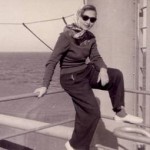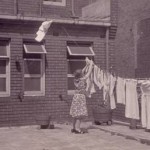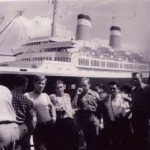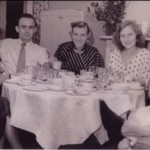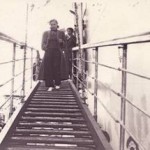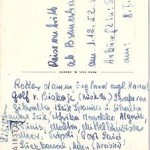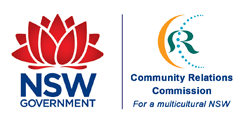Cultural background: German
Place of origin: Germany
Date of arrival: 1950s
Interview of Paula Maly by her grandson Jeffrey Cleall, as part a school history assignment.
My Grandmother, Paula Berta Maly (nee Holona) was born in Oberhausen, Reinland, Germany, on 23rd March, 1931 to Emilie and Johann Holona. She was the youngest of seven children. On the 18th January, 1945, at the age of 13, she and her brother had to flee the invasion of the Russians into Germany and escaped to Berlin.
She had to leave behind her mother and sisters and eventually after the war lived with her father in Berlin.
In Berlin she met my Grandfather, Franz Maly, who was born on 22nd August, 1931 and was the elder of two boys born to Franz and Emnosti Maly. When my Grandmother laid eyes on my Grandfather, it was “love at first sight”. My Grandmother followed my Grandfather to Australia in 1952, and they lived happily together in Australia for 50 years. Sadly, my Grandfather passed way in April, 2002, but his memory lives on in the stories that my Grandmother has told me.
Q1. WHAT MADE YOU DECIDE TO MIGRATE TO AUSTRALIA?
As a young couple who had recently become engaged in Berlin, we had heard about the freedom in Australia and the sunny, beautiful climate there.
We were young, in love and engaged to be married, and after the horrors of the war in Europe we wanted a fresh start, as Germany had been occupied by the Americans, Russians, French and British. We wanted an adventure and to start a new life in a free country, called Australia.
Q2. HOW DID YOU APPLY TO MIGRATE?
After the war, there were lots of advertisements in the local German newspapers asking for young, qualified people with trades to migrate to Australia on a two year contract. These advertisements invited young people to come to Australia. In early 1952 we decided to go to the Australian Immigration Department to place our name on the lists.
Q3. WHAT WERE THE REGULATIONS SET BY THE AUST. GOVT &
Q4. DID YOU HAVE TO SIGN A CONTRACT?
In 1952, only German men were able to migrate to Australia. My Grandfather had to sign a two-year contract with the Australian government saying that he would work in Australia for two years. He was an Electrician by trade and was allowed to migrate to Australia because he was a qualified Electrician. However, when he arrived in Australia in September, 1952 he did not get work as an Electrician. The government gave him a job at the Railway, as an engine cleaner. He lived in the railway hostel and he had to clean the dirty engines. Within a year he had paid back his fare and he was able to leave the railway and work in his own occupation which was as an Electrician.
Q5. DID YOU HAVE TO PAY FOR YOUR FARE TO COME HERE?
My Grandfather had to pay back his whole fare while he was working under the two year contract. The Government deducted his fare from his wages every fortnight.
Q6. HOW DID YOU TRAVEL TO AUSTRALIA?
My Grandfather lived in Berlin and flew to Hamburg. From Hamburg he caught a train to Naples in Italy and from Naples he boarded a ship to Australia. This ship was called the “Napoli”. There were many fellow “Berliners” on board and my Grandfather made life-long friends from amongst his fellow-passengers.
The ship my Grandfather sailed on was only the second ship which took German migrants to Australia after the war. He left Germany on his 21st birthday, 22nd August, 1952 and arrived in Sydney at the end of September, 1952. Whilst he was on the ship at Port Said, my Grandmother found out that German women were now also allowed to migrate to Australia. She immediately went to the Australian Immigration Department and put in her application to migrate to Australia. She was astonished at how quickly the paperwork was finalised and she left Germany on the 1st December, 1952 from Bremerhaven and arrived in Sydney on the 8th January, 1953. She had to leave Berlin by plane and flew to Bremerhaven where she boarded the “Fairsea” to Sydney. Her fare was paid half by the German government and half by the Australian government. She didn’t have to pay the fare herself, unlike my Grandfather. However, she did have to sign a two year contract to work in Australia. The two year contract ensured that migrants would not leave Australia if they were not happy, until after the two years were up. But my Grandparents fell in love with Australia from day one. And they never looked back.
Q7. WHERE DID YOU FIRST LIVE WHEN YOU ARRIVED IN AUSTRALIA?
My grandfather lived in the railway hostel in Newtown with other migrants. Opa continued to work at the railway but moved to another room in the Westminster Hotel, while he paid off his fare to the Australian government. Long before his two year contract expired he had paid off his fare and went to work in his own trade, as an electrician, for the Water Board.
(My Grandfather later worked for O’Donnell & Griffin as a Foreman and stayed with this company for 40 years until his retirement. He trained all the apprentices over his many years with ODG, and was the longest-serving employee ever!)
When my Grandmother arrived in Australia the authorities on board the “Fairsea” told her that if she wished she could leave the ship and look for a job and accommodation herself. As my Grandmother was still learning English and needed a job quickly she much preferred to take the job that was offered by the people that had come on board the ship.
When my Grandmother arrived in Sydney the owner of the Westminster Hotel at Broadway, Mrs Coyle came on board the “Fairsea” and asked if any of the women on board were interested in working for her at her hotel. My Grandmother was interviewed and was offered the job of cooking breakfast, lunch and dinner for Mr & Mrs Coyle. She was given her own room in the Westminster Hotel to live in. In between breakfast and lunch she had time off and also between lunch and dinner, and her week finished on Saturday lunch time when she had time off until Monday morning. My Grandmother was very happy working as a personal cook for the owners of the Westminster Hotel, Mr & Mrs Coyle.
When my Grandparents got married in May, 1953, my Grandmother left the employ of the Westminster Hotel.
Q8. HOW DID YOU LEARN TO SPEAK ENGLISH?
My Grandmother was taught some English by the owners of the Westminster Hotel while she was in their employ. Both of my Grandparents also learnt English by correspondence. As my Grandfather was working with both Europeans and Australians, he found it much easier to learn English. It was harder and slower for my Grandmother, as she worked in restaurants with lots of Europeans, and not many Aussies.
Q9. WERE THERE PEOPLE OF THE SAME ETHNIC BACKGROUND AS YOU WHERE YOU LIVED?
In the Westminster Hotel there were mostly Australians. In the hostel
there were many different nationalities. My Grandfather travelled to Australia with many Germans from Berlin who also started their working life in Australia working for the railway. He remained lifelong friends with all of these people from Berlin. They all became founding members of the German Club in Stanmore, called the “Concordia Club” and regularly played skittles and golf together.
When my Grandparents married in May 1953, they moved to the “Ashfield Private Hotel” in Victoria Street, Potts Point. Here they came in contact with all nationalities, such as Germans, Polish, Hungarians, Greeks, English and Australians.
Q10. WHAT PROBLEMS DID YOU FACE SETTLING IN? WERE YOU HOMESICK? (Language, work, friends)
My grandparents were very happy in Australia, but didn’t really decide to remain in Australia permanently until they had bought their first home in Kensington, after living in Australia for five years. They were sometimes very homesick for their families in Germany, especially at Christmas time, when they would celebrate Christmas the traditional, German way. (For example, they would always buy a fresh, pine Christmas tree, and they would decorate it with real candles which sit in little candle holders attached to the branch, which they lit on Christmas Eve. The whole house would smell of fresh pine. And the tree was decorated with German tinsel (Lametta) and German traditional glass decorations. To this day we still follow their German Christmas traditions)
It was very important to them to own their own home. They had come to Australia with nothing and my Grandfather had to pay back the cost of his fare to the government. They worked very hard to save a deposit to buy their own home and were very proud when they achieved this. It took them five years to get their deposit and once they bought their own home in Kensington, they lived very happily. My grandparents loved Australia from the first moment, but being able to buy their own home sealed their love of Australia and made them feel secure. They became Australian citizens after 10 years in 1963.
Q11. WHAT DIFFERENCES DID YOU FIND IN CLOTHING, FOOD, AND HOUSING?
It was very exciting for my Grandparents to be able to afford to buy a
house in Australia as many people in Germany lived in apartments. Australia is such a huge country and houses were being built and bought in the suburbs. My Grandparents found English/Australian food a little bland, but they loved fish and chips which were new to them. Because of the many different nationalities and friends that they made, and because my Grandmother started working in continental restaurants, she started to learn to cook Italian and Hungarian food as well as her native German food.
Q12. WHAT WAS YOUR FIRST JOB IN AUSTRALIA?
When my Grandmother left the Westminster Hotel when she married
my Grandfather, she started working in European restaurants, such as the “Adria” in Kings Cross, and then she worked at the Max Factor cosmetic factory, and then at Mars Bar Barbeque in Pitt Street. Because of her work in the restaurants she learnt many different types of cuisine.
Q13. WHEN DID YOU FINALLY FEEL THAT YOU HAD ASSIMILATED INTO THE AUSTRALIAN CULTURE?
Once my Grandparents had bought their home in Kensington in the eastern suburbs they were surrounded by Australians and that’s when they became “real Aussies”. My mother was born in 1954 and was four when the family moved to their new home in Kensington and started assimilating with the local Australians. Potts Point and Kings Cross were very much more European back in the early 1950’s.
Q14. WHEN DID YOU BECOME AUSTRALIAN CITIZENS?
My grandparents became Australian citizens after 10 years, on 14th March, 1963. The ceremony was held at the Randwick Council Chambers and my grandmother remembers that they were quite emotional. There were many people that day who became proud Australians.
Q15. WHAT DO YOU LOVE THE MOST ABOUT AUSTRALIA?
The most important thing that my Grandmother loves about Australia is BEING FREE and living her life to the fullest, the way that she wants to live without anyone telling her what to do. After the horrors of part of her childhood in war-torn Germany the freedom she found in Australia is priceless!
